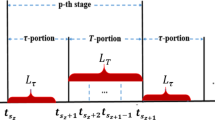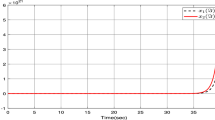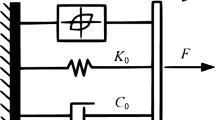Abstract
The performance of mixed \(H_{\infty }\) and passivity for T-S fuzzy system under the non-fragile memory sampled-data controller is considered in this paper. We construct a non-fragile memory sampled-data controller, which includes a constant signal transmission delay. And by constructing an augment Lyapunov–Krasovskii functional (LKF), taking into account Wirtinger-based integral inequality and the Convex combination technique, we can get a new criteria that mixed \(H_{\infty }\) and passivity for closed-loop system. Numerical examples are used to demonstrate the effectiveness and superiority of the results.






Similar content being viewed by others
References
Takagi T, Sugeno M (1985) Fuzzy identification of systems and its applications to modeling and control. IEEE Trans Syst Man and Cybernet 15(1):116–132
Zhao X, Lin C, Chen B, Wang Q (2018) A novel Lyapunov–Krasovskii functionalal approach to stability and stabilization for T-S fuzzy systems with time delay. Neurocomputing 313:288–294
Wang Y, Shen H, Karimi H, Duan D (2018) Dissipativity-based fuzzy integral sliding mode control of continuous-time T-S fuzzy systems. IEEE Trans Fuzzy Syst 26(3):1164–1176
Tang P, Ma Y (2019) Exponential stabilization and sampled-data control for uncertain T-S fuzzy systems with time-varying delay. J Franklin Inst 356:4859–4887
Shen H, Dai M, Luo Y, Cao J (2020) Fault-tolerant fuzzy control for semi-Markov jump nonlinear systems subject to incomplete SMK and actuator failures. IEEE Trans Fuzzy Syst. https://doi.org/10.1109/TFUZZ.2020.3011760
Wang J, Xia J, Shen H, Xing M, Park J (2020) Synchronization for fuzzy Markov jump chaotic systems with piecewise-constant transition probabilities subject to PDT switching rule. IEEE Trans Fuzzy Syst. https://doi.org/10.1109/TFUZZ.2020.3012761
Xia Y, Wang J, Meng B, Chen X (2020) Further results on fuzzy sampled-data stabilization of chaotic nonlinear systems. Appl Math Comput 379:125225
Pan Y, Du P, Xue H, Lam H (2020) Singularity-free fixed-time fuzzy control for robotic systems with user-defined performance. IEEE Trans Fuzzy Syst. https://doi.org/10.1109/TFUZZ.2020.2999746
Du P, Pan Y, Li H, Lam H (2020) Nonsingular finite-time event-triggered fuzzy control for large-scale nonlinear systems. IEEE Trans Fuzzy Syst. https://doi.org/10.1109/TFUZZ.2020.2992632
Park M, Kwon O, Ryu J (2018) Advanced stability criteria for linear systems with time-varying delays. J Franklin Inst 355(1):520–543
Yu H, Ma Y, Liu J (2019) Extended dissipative analysis for uncertain T-S fuzzy system with time-varying delay and randomly occurring gain variations. J Franklin Inst 356(15):8542–8568
Zhao W, Ma Y, Chen A, Zhang Y (2019) Robust sliding mode control for Markovian jump singular systems with randomly changing structure. Appl Math Comput 349:81–96
Liang H, Liu G, Zhang H, Huang T (2020) Neural-network-based event-triggered adaptive control of nonaffine nonlinear multiagent systems with dynamic uncertainties. IEEE Trans Neural Netw Learn Syst. https://doi.org/10.1109/TNNLS.2020.3003950
Kim H, Park J, Joo Y (2018) Sampled-data control of fuzzy systems based on the intelligent digital redesign technique: an input-delay approach. Int J Control Auto Syst 16(1):327–334
Rathinasamy S, Sa K, Boomipalagan K, Alzahrani F (2018) Dissipativity-based non-fragile sampled-data control design of interval type-2 fuzzy systems subject to random delays. ISA Trans 83:154–164
Vimal Kumar S, Raja R, Marshal Anthoni S (2018) Robust finite-time non-fragile sampled-data control for T-S fuzzy flexible spacecraft model with stochastic actuator faults. Appl Math Comput 321:483–497
Sakthivel R, Saravanakumar T, Ma Y, Marshal Anthoni S (2017) Finite-time resilient reliable sampled-data control for fuzzy systems with randomly occurring uncertainties. Fuzzy Sets Syst 329:1–18
Samidurai R, Sriraman R (2019) Non-fragile sampled-data stabilization analysis for linear systems with probabilistic time-varying delays. J Franklin Inst 356(8):4335–4357
Kin H, Park J, Joo Y (2018) A fuzzy Lyapunov–Krasovskii functional approach to sampled-data output-feedback stabilization of polynomial fuzzy systems. IEEE Trans Fuzzy Syst 26(1):366–373
Ge C, Shi Y, Park J (2019) Robust stabilization for T-S fuzzy systems with time-varying delays and memory sampled-data control. Appl Math Comput 346:500–512
Luo J, Liu X, Tian W (2020) A new approach to generalized dissipativity analysis for fuzzy systems with coupling memory sampled-data control. Appl Math Comput 368:124774
Liu Y, Guo B, Park J, Lee S (2018) Non-fragile exponential synchronization of delayed complex dynamical networks with memory sampled-Data control. IEEE Trans Neural Netw Learn Syst 29(1):118–128
Shi K, Wang J, Zhong S (2019) Non-fragile memory fltering of T-S fuzzy delayed neural networks based on switched fuzzy sampled-data control. Fuzzy Sets Syst. https://doi.org/10.1016/j.fss.2019.09.001
Park M, Kwon O, Ryu J (2017) Advanced stability criteria for linear systems with time-varying delays. J Franklin Inst 355(1):520–543
Wang L, Liu J (2018) Local stability analysis for continuous-time Takagi–Sugeno fuzzy systems with time delay. Neurocomputing 273:152–158
Seuret A, Liu K, Gouaisbaut F (2018) Generalized reciprocally convex combination lemmas and its application to time-delay systems. Automatica 95:488–493
Liu Y, Park J, Guo B, Shu Y (2018) Further results on stabilization of chaotic systems based on fuzzy memory sampled-data control. IEEE Trans Fuzzy Syst 26(2):1040–1045
Zeng H, Teo K, He Y (2019) Sampled-data-based dissipative control of T-S fuzzy systems. Appl Math Comput 65:415–427
Wang Y, Karimi H, Lam H-K, Shen H (2018) An improved result on exponential stabilization of sampled-Data fuzzy systems. IEEE Trans Fuzzy Syst 26(6):3875–3883
Zhao J, Liu W, Zhang G (2018) Sampled-data based quantisation control for T-S fuzzy switched systems with actuator failures dependent on an improved Lyapunov functional method. IET Control Theory Appl 12(17):2368–2379
Cheng J, Park J, Liu Y (2017) Finite-time fuzzy control of nonlinear Markovian jump delayed systems with partly uncertain transition descriptions. Fuzzy Sets Syst 314:99–115
Ma Y, Jia X, Zhang Q (2018) Robust observer-based finite-time control for discrete-time singular Markovian jumping system with time delay and actuator saturation. Nonlinear Anal Hybrid Syst 28:1–22
Yang G, Xie J, Kao Y, Wang C (2017) Robust non-fragile control for delayed singular Markovian jump systems with actuator saturation and partially unknown transition probabilities. Int J Robust Nonlinear Control 27:2669–2687
Du X, Yang Z, Jin Z, Xia C, Bao D (2018) A comparative study of passive control on flow structure evolution and convective heat transfer enhancement for impinging jet. Int J Heat Mass Transfer 126:256–280
Eljajeh Y, Petkovski M (2018) Self-adaptive approach for optimisation of passive control systems for seismic resistant buildings. Original Res Paper 16:3171–3194
Chen J, Lin C, Chen B, Wang Q (2017) Mixed and passive control for singular systems with time delay via static output feedback. Appl Math Comput 293:244–253
Shen H, Su L, Park J (2017) Reliable mixed /passive control for T-S fuzzy delayed systems based on a semi-Markov jump model approach. Fuzzy Sets Syst 314:79–98
Zheng Q, Zhang H, Ling Y, Guo X (2018) Mixed \(H_{\infty }\) and passive control for a class of nonlinear switched systems with average dwell time via hybrid control approach. J Franklin Inst 355:1156–1175
Zheng Q, Zhang H (2018) Mixed and passive filtering for switched Takagi-Sugeno fuzzy systems with average dwell time. ISA Trans 75:52–63
Huo S, Chen M, Shen H (2017) Non-fragile mixed and passive asynchronous state estimation for Markov jump neural networks with randomly occurring uncertainties and sensor nonlinearity. Neurocomputing 227:46–53
Sakthivel R, Saravanakumar T, Ma Y, Anthoni S (2017) Finite-time resilient reliable sampled-data control for fuzzy systems with randomly occurring uncertainties. Fuzzy Sets Syst 329:1–18
Wang Y, Hu X, Shi K, Song X, Shen H (2020) Network-based passive estimation for switched complex dynamical networks under persistent dwell-time with limited signals. J Franklin Inst 357:10921–10936
Seuret A, Gouaisbaut F (2013) Wirtinger-based integral inequality: application to time-delay systems. Automatica 49(9):2860–2866
Zeng H, Park J, Xia J, Xiao S (2014) Improved delay-dependent stability criteria for T-S fuzzy systems with time-varying delay. Appl Math Comput 235:492–501
Yoneyama J (2010) Robust control of uncertain fuzzy systems under time-varying sampling. Fuzzy Sets Syst 161:859–871
Yoneyama J (2012) Robust sampled-data stabilization of uncertain fuzzy systems via input delay approach. Inf Sci 198:169–176
Acknowledgements
The authors would like to express their gratitude to the editor and the anonymous referees for their valuable suggestions that have greatly improved the quality of the paper.
Funding
This research was supported by National Natural Science Foundation of China (Grant 61273004).
Author information
Authors and Affiliations
Corresponding author
Rights and permissions
About this article
Cite this article
Liu, Y., Ma, Y. Mixed \(H_{\infty }\) and passivity analysis for T-S fuzzy system with non-fragile memory sampled-data control via augment Lyapunov–Krasovskii functional. Int. J. Mach. Learn. & Cyber. 12, 2933–2945 (2021). https://doi.org/10.1007/s13042-021-01379-5
Received:
Accepted:
Published:
Issue Date:
DOI: https://doi.org/10.1007/s13042-021-01379-5




